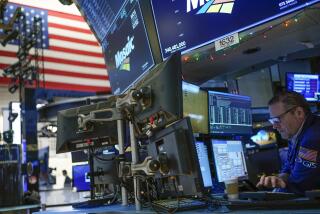Growth Stocks’ Earnings Facing Tough Scrutiny
- Share via
In the stock market, it’s never too early to share bad news.
With three weeks left before second-quarter earnings reports really start to flow, some companies are already warning that they won’t make analysts’ profit projections.
Wall Street is supposed to be looking ahead to an economic recovery in the second half of the year and therefore shouldn’t care about this quarter’s recession-tinged results--or so you’d think.
Yet investors continue to greet most earnings confessions with the usual how-could-you-do-this-to-me burst of machine gun fire. Two examples:
* Environmental cleanup firm Calgon Carbon saw its stock plummet $6 to $22.25 last Thursday after the company said the slow economy will put the quarter’s earnings 20% to 25% below year-earlier levels.
* Thursday and Friday, Van Nuys-based security services firm Pinkerton’s Inc. tumbled $5 to $26.75 after a Smith Barney, Harris Upham & Co. analyst projected flat earnings for the quarter. The analyst said the company indicated that its margins were under pressure from the cost of luring new security guard contracts.
When individual stocks lose 15% to 20% overnight on earnings disappointments, you naturally start to wonder about the market overall. If enough earnings troubles were to crop up to take the Dow Jones industrial average down 15%, the index would lose a fast 450 points from its close Friday of 3,000.45. Not a happy thought.
So are investors expecting way too much from second-quarter earnings reports, even though they know the economy has only recently come to life?
The answer is a split decision. Many Wall Streeters believe that one big segment of the market--the industrial stocks--will mostly be spared a trip to the woodshed, even if their second-quarter numbers are worse than expected.
“If a steel company, aluminum or paper company has a poor second quarter, I don’t think it will matter,” argues Eric Miller, investment strategist at Donaldson Lufkin & Jenrette Securities Corp. in New York.
The reason, Miller says, is that investors are focusing much more intently on what those companies are likely to earn as the economy recovers in 1992 and beyond. Everybody knows, or should know, that demand for industrial goods has only barely rebounded so far this year.
But for the consumer-growth stocks that have served as a safe haven for many investors in recent years, earnings shortfalls could prove more devastating than ever, Miller and others warn.
“There is no tolerance at all in the institutional mentality for even a slight disappointment in growth stock earnings,” says David Bostian, investment strategist for Jesup, Josephthal & Co. in New York.
The growth stocks, which include such long-popular issues as food and drug companies and service firms such as Calgon Carbon and Pinkerton’s, have until now proved to be largely recession-resistant. That’s one of their big attractions: Stable demand for their products keeps earnings growing in good times and bad.
In the first quarter, even as the Persian Gulf War raged and American consumers closed their pocketbooks in fear, earnings at most food and drug firms continued to rise at the usual 15% to 20% rates that Wall Street has come to expect.
But lately, some of the biggest consumer-goods stars appear to have faltered, some analysts say. If investors aren’t prepared for potential second-quarter disappointments in the group, the stocks could be brutalized.
Miller, for example, says his food analyst recently lowered the second-quarter estimate for soft drink and restaurant giant Pepsico Inc. to 40 cents a share from 42 cents (operating earnings). The company, which also owns snack food firm Frito-Lay, is facing higher costs from a potato shortage and other short-term problems.
At 40 cents, Pepsico’s earnings would be just 8% above year-ago results of 37 cents. In the first quarter, the company’s earnings grew 13%. Though the stock has already fallen to $30.875 as of Friday from a 1991 high of $35.625, some analysts wonder whether Pepsico will still be vulnerable when its earnings report is released in July.
Likewise, analyst John McMillin at Prudential Securities in New York warns that executives of Philip Morris Cos. were decidedly “more muted” about company prospects in a recent presentation to analysts. The food side of the consumer-goods monolith (Marlboro, Kraft, Oscar Mayer) is “feeling more of the impact of the U.S. recession than originally anticipated,” McMillin said.
What’s more, “competition in the food environment seems to have intensified” overall, he said, as consumers demand better values. Add to that the negative effects of the strong dollar on multinational food companies, and many of the firms could be hard-pressed to make second-quarter profit targets.
Drug and other health-care stocks, meanwhile, are still seeing their second-quarter earnings estimates raised by analysts, says Ben Zacks, head of earnings-tracker Zacks Investment Research in Chicago. If anything goes wrong in that group--problems from the strong dollar, for instance--look out below, Zacks says.
It’s worth remembering, though, that some Wall Streeters have been trying to talk down the food, drug and other consumer-growth stocks for several years. There’s a whole school of analysts out there who believe that these stocks are tired, after dominating the market for nearly 10 years. It’s time for industrial stocks to take the lead now, this group says.
Whether the anti-growth-stock forces will be right this time remains to be seen. But it’s clear that when second-quarter earnings pour out in July, the greatest scrutiny will be paid to the reports of the growth companies--and they’ll have the most to prove. If you own them, be prepared.
For this quarter, at least, the still-struggling industrial companies are more likely to be forgiven for whatever lousy profits they turn in. And if the industrial companies perform better than expected, the stocks’ on-again, off-again rally could ignite like wildfire.
A Good Earnings Surprise?Earnings tracker Zacks figures the average blue chip company in the Standard & Poor’s 500 index will post a 9% drop in second-quarter profits versus a year ago, as the recession takes its final swipe.
If you’re looking for positive surprises, look to banks and other financial companies, Zacks says. He believes that that group’s second-quarter profits will soar, thanks to the large spread the banks have enjoyed between their cost of money (short-term deposits) and their assets (long-term loans) in the quarter.
Zacks doesn’t worry about the potential for higher problem loans at banks, figuring that improving earnings will cover any new loan troubles.
Meanwhile, don’t look for good news in technology companies’ second-quarter numbers, Zacks says. Even with the earnings-estimate cuts that analysts have made, there’s more carnage ahead because of the industry slowdown, he says. “It’s going to be a mess,” he says.
Where Earnings Better Shine . . .
Second-quarter EPS Est. Stock price, Company 1990 1991E change 1991 gain* Amgen $0.29 $0.70 +141% $118, +90% Beverly Enterprises 0.05 0.09 +80% 10 5/8, +23% Hershey Foods 0.34 0.42 +24% 42 1/2, +13% Sara Lee 0.48 0.58 +21% 39 3/4, +25% Philip Morris 1.03 1.25 +21% 66 3/4, +29% PacifiCare Health 0.41 0.49 +20% 34 1/2, +112% Bristol-Myers Squibb 0.79 0.95 +20% 81, +21% Coca-Cola 0.61 0.72 +18% 56 1/8, +21%
. . . and Where Expectations Are Low
Second-quarter EPS Est. Stock price, Company 1990 1991E change 1991 gain* Teledyne $0.48 $0.45 -6% $19 3/8, +31% TRW Inc. 1.02 0.70 -31% 41 1/4, +9% Cincinnati Milacron 0.12 0.01 -92% 13 3/4, +25% Cummins Engine 0.15 -2.20 -- 42 5/8, +14% Bethlehem Steel 0.21 -0.60 -- 16 7/8, +14%
* stock price change year-to-date; S&P; 500 is up 16%, for comparison
Source: Value Line Investment Survey
More to Read
Inside the business of entertainment
The Wide Shot brings you news, analysis and insights on everything from streaming wars to production — and what it all means for the future.
You may occasionally receive promotional content from the Los Angeles Times.










